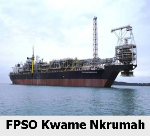Gas supply improves
- Details
- Created on Saturday, 12 April 2014 19:56
Gas supply from Nigeria has picked up from a low of 50 million to 100 million standard cubic feet per day, inching closer to the 120 million contractual volume, Mr. Kofi Ellis, Director, Planning & Business Development at the VRA, has said.
"The past few days supply has been about 100 million standard cubic feet per day and we are virtually using it to pack the pipeline.
It means we are storing the gas in the pipeline all the way from Nigeria to Ghana so that in case supply goes down, at least we will have a few reserves in the pipeline that can help us run" he told the B&FT on the sidelines of the Oil and Gas summit in Accra.
He could not tell, however, whether supply will remain that high for the long-term in view of the intermittent sabotage of pipelines in Nigeria that feed into the West Africa Gas Pipeline.
Asked whether the improvement in gas supply will end the, load-shedding, he said: “Already you have seen an improvement in power supply, haven't you? I am telling you that by the end of this month, when all the machines under maintenance are fixed, the power situation will normalise”.
CEO of the Ghana Grid Company (GRIDCo) William Amuna also said: “You have seen it; over the past few days it's been better. Load-shedding has gone down a little and we are hoping that it will be better still. The issue now has to do with some of the generators that are not back. When they are back, we expect that there will be an increase in power generation and the situation will improve”.
Aside from the decline in gas supply from Nigeria, the power sector managers have cited as causes of the load-shedding machine breakdowns and expansion works at the Takoradi 2(T2) power plant, which will increase its capacity from 220 megawatts to 340 megawatts.
The increasing number of thermal plants in the country's generation mix is pushing gas demand over the rooftops.
Demand is pegged at 400million standard cubic feet per day.
With its eyes set on the country's own gas from the jubilee oil field, government wants gas to contribute up to 50% in thermal power generation by 2015. The other half will be crude, which is twice as expensive.
Consumers have been livid over the erratic supply of power in the country, with industrialists in particular complaining about its impact on their businesses.
The quarterly business barometer by the Association of Ghana Industries, which measures confidence in the business environment, hasoften cited power supply as oil of the major challenges businesses in the country.
On Wednesday April 9 2014, the industrialists registered their displeasure at a meeting with the power utilities in Accra asking for an immediate end to the power crisis.
"We are not at all satisfied with their responses. What we I want is an immediate solution to the power crisis. We all found out from this discussion that fuel is really what they need. If they can get the fuel, of course I the turbines will be running - and this is the crux of the matter," Dr. Adu Gyamfi, AGI's Vice President in charge of Large Scale Industries, told the B&FT at that meeting.
source: myjoyonline






